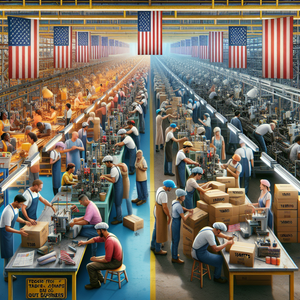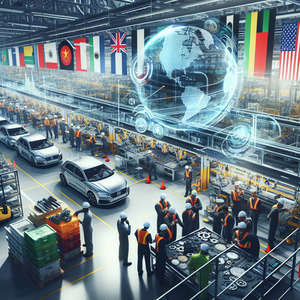
The Impact of Trump’s Tariffs on U.S. Jobs: How Trade Policies Are Shaping Industries and Careers
The tariffs introduced under President Donald Trump’s administration have left a lasting imprint on the U.S. economy. Aimed at bolstering domestic industries and reducing reliance on foreign imports, these policies have created ripples across various sectors, resulting in both opportunities and challenges for the American workforce. While some industries, such as steel and aluminum, have reaped the benefits of increased domestic production, others—particularly technology, automotive, retail, and energy—have been burdened with higher costs, disrupted supply chains, and economic uncertainties.
Job Summaries:
Trade Compliance Specialist:
- The maze of regulations introduced by the tariffs has made compliance a top priority for many businesses.
- Trade Compliance Specialists ensure companies adhere to international trade laws, keep up with tariff schedules, and maintain proper documentation to avoid costly penalties.
- Professionals with backgrounds in international business or law, as well as certifications like the Certified Customs Specialist (CCS), are seeing heightened demand as companies seek to navigate this regulatory landscape with precision.
Supply Chain Analyst:
- Tariff-induced disruptions have forced companies to reevaluate their supply chains, making Supply Chain Analysts essential players in mitigating risks.
- These professionals assess global sourcing strategies, analyze supplier reliability, and identify cost-effective alternatives to counter rising import duties.
- Strong analytical skills and expertise in logistics are key to thriving in this role.
Manufacturing Engineer:
- As tariffs incentivize reshoring, Manufacturing Engineers are at the forefront of optimizing domestic production.
- These engineers design efficient manufacturing processes, often by integrating automation to offset higher labor costs.
- A background in mechanical or industrial engineering, paired with proficiency in CAD software, is crucial for success in this role.
Procurement Manager:
- With tariffs driving up the cost of imported goods, Procurement Managers play a critical role in sourcing alternatives.
- They negotiate contracts, identify reliable suppliers, and implement strategies to minimize expenses.
- Professionals with strong negotiation skills and a background in global sourcing are particularly sought after as companies adapt to the new economic realities.
Trade Policy Analyst:
- The dynamic nature of trade policies has created demand for Trade Policy Analysts who can interpret and forecast the economic implications of tariffs.
- These professionals provide vital insights to lawmakers and businesses, helping them make informed decisions.
- A solid foundation in economics, public policy, or international relations is indispensable for this role.
Automation Specialist:
- To counter rising production costs, many companies are investing in automation.
- Automation Specialists design and implement systems that streamline manufacturing processes, boosting efficiency and reducing reliance on costly imports.
- Expertise in robotics, programming, and systems integration is highly valued in this field.
Logistics Coordinator:
- As supply chains face disruptions and delays, Logistics Coordinators are ensuring the smooth movement of goods.
- They manage transportation schedules, monitor freight rates, and ensure compliance with trade regulations.
- A background in logistics or supply chain management is essential for excelling in this role.
Economic Risk Analyst:
- With tariffs introducing new layers of economic uncertainty, Economic Risk Analysts are tasked with assessing financial risks and forecasting challenges.
- These professionals help businesses navigate volatile market conditions, providing actionable insights to mitigate losses.
- Advanced skills in economics or finance make analysts invaluable in this uncertain climate.
Global Sourcing Specialist:
- Global Sourcing Specialists are responsible for identifying cost-effective suppliers and mitigating the impact of tariffs on global procurement.
- These professionals analyze international markets, negotiate contracts, and manage supplier relationships to ensure continuity and cost efficiency.
Energy Market Analyst:
- Tariffs on imported energy resources have reshaped the domestic energy market, creating opportunities for Energy Market Analysts.
- By analyzing pricing trends and evaluating the impact of tariffs on energy production, these analysts provide critical insights for energy companies and policymakers.
Customs Broker:
- Customs Brokers are essential for navigating the complexities of international trade in a tariff-driven world.
- By ensuring accurate documentation, calculating duties, and maintaining compliance, they reduce delays and minimize additional costs for businesses.
Industrial Designer:
- The push toward reshoring has prompted companies to develop products tailored for domestic manufacturing.
- Industrial Designers are tasked with creating cost-effective, innovative designs that align with U.S. production capabilities, playing a key role in keeping products competitive.
Financial Analyst – Trade Strategy:
- Financial Analysts focused on trade strategy help businesses adapt to the financial pressures caused by tariffs.
- They prepare budgets, assess risks, and recommend cost-saving measures, ensuring companies remain profitable in a challenging economic environment.
Transportation Manager:
- Transportation Managers oversee the efficient movement of goods, helping businesses adapt to tariff-induced disruptions.
- They optimize shipping routes, negotiate freight rates, and manage compliance with changing trade regulations.
Reshoring Consultant:
- As companies look to relocate production back to the U.S., Reshoring Consultants provide critical expertise.
- They conduct cost-benefit analyses, identify potential sites, and oversee the transition, helping businesses capitalize on the incentives for domestic production.
The tariffs implemented during Donald Trump’s presidency have fundamentally reshaped the U.S. job market, creating opportunities in manufacturing, automation, and trade compliance while posing challenges for industries reliant on global supply chains. These policies have also spurred demand for specialized roles aimed at navigating the complexities of international trade, mitigating risks, and maintaining competitiveness in an unpredictable economic landscape. While the long-term effectiveness of these tariffs remains debated, their immediate impact on the job market is undeniable. By understanding the skills and expertise required to thrive in this evolving environment, job seekers can prepare themselves for the opportunities and challenges that lie ahead. For businesses, adapting to these changes is not just a matter of survival—it’s an opportunity to innovate and grow in the face of adversity.
Explore More Jobs

